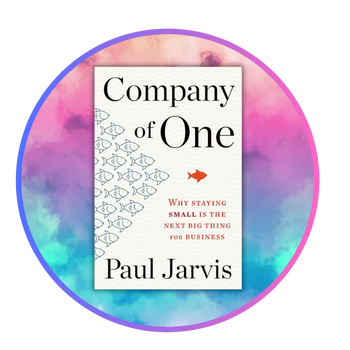
Today, we’re diving into a game-changing concept that challenges the traditional notions of business success. We’ve all heard about the giants—the Amazons, the Apples, and the Bill Gates of the world. But what if I told you that success doesn’t have to mean scaling up to those colossal levels?
“Company of One” by Paul Jarvis challenges the traditional notion of business success, urging individuals to reconsider the pursuit of growth for the sake of growth. The book advocates for a more holistic approach, emphasizing the benefits of staying small, setting firm growth limits, and focusing on personal well-being and autonomy.
Key Takeaways:
1. Rejecting the “More” Philosophy:
- Modern capitalism often revolves around the relentless pursuit of more – more consumption for consumers and more growth for businesses.
- Companies of one challenge this philosophy by setting limits on growth, aiming to achieve just enough revenue for a comfortable and satisfying life.
2. Companies of One vs. Traditional Small Businesses:
- Companies of one differ from traditional small businesses by embracing smallness as a mark of success, not failure.
- The focus is on achieving and sustaining a self-defined level of income rather than aspiring to endless expansion.
3. Starting as a Side Gig:
- The journey toward a company of one often begins with a side gig, allowing individuals to test and develop their business ideas without immediately quitting their day jobs.
- Tom Fishburne’s example in “Company of One” emphasizes the process of developing a company of one from a side gig while maintaining financial stability. After working in marketing for 20 years, Fishburne pursued his childhood hobby of cartooning in his free time. He turned it into a side gig by taking on clients during weekends and evenings. Crucially, he didn’t quit his marketing job until he had built a solid client base and saved enough money to cover living expenses for slow months. Seven years ago, Fishburne transitioned to cartooning full-time, exceeding his previous income. His example highlights the importance of a gradual and strategic approach to building a company of one, emphasizing financial security and passion for the work.
4. Pursuing Marketable Skills Over Passion:
- Rather than solely following passion, the book recommends identifying and developing marketable skills that others will pay for.
- Practicality is emphasized, encouraging individuals to focus on what they are good at and can turn into a viable business.
5. Niche Targeting and Simplicity:
- Companies of one find success by targeting specific niches, avoiding the pitfalls of trying to appeal to everyone.
- Embracing simplicity in both product offerings and branding helps create a unique and appealing identity.
6. Gradual Growth and Minimal Investments:
- The book advises against large upfront investments, urging entrepreneurs to focus on profitability from the start.
- The concept of a gradual snowball effect, exemplified by entrepreneurs like Alexandra Franzen and Ugmonk, highlights the power of organic growth without unnecessary financial risks. Alexandra Franzen, a professional writer, started small with just three projects, which led to more clients through referrals, creating a sustained, year-long waiting list for her services. Similarly, Ugmonk, a clothing company, began with a modest $2,000 loan and a small run of 200 shirts. The success of these initial ventures allowed for incremental expansion, reinvesting profits back into the businesses and avoiding large upfront investments until necessary. These examples emphasize the effectiveness of a measured, organic approach to growth in building a successful company of one.
7. Customer Service and Retention:
- The small size of companies of one enables a personal approach to customer service, a crucial element for success.
- Emphasizing customer retention over churn-and-burn strategies is essential for long-term profitability and positive word-of-mouth referrals.
8. Applying Principles to Larger Companies:
- The principles of a company of one can be applied to larger companies, encouraging a focus on sustainability, customer satisfaction, and individual empowerment.
Conclusion: “Company of One” challenges the traditional narrative of business success, advocating for a more personalized and sustainable approach. By embracing smallness, setting growth limits, and prioritizing individual well-being, entrepreneurs can build successful businesses that align with their values and lifestyle preferences. The book’s insights are not only applicable to those considering entrepreneurship but also offer valuable lessons for individuals within larger organizations seeking a more meaningful and balanced professional life.
And if you’re as captivated as we were, grab your own copy through the link below:
📚Amazon International: https://amzn.to/47J9fe2
📚Amazon Australia: https://amzn.to/3uqaUqI
we’d love to hear your thoughts! And if you believe in the power of knowledge, share this post with your friends and help us spread the word. Together, we can empower minds and make a lasting impact.
